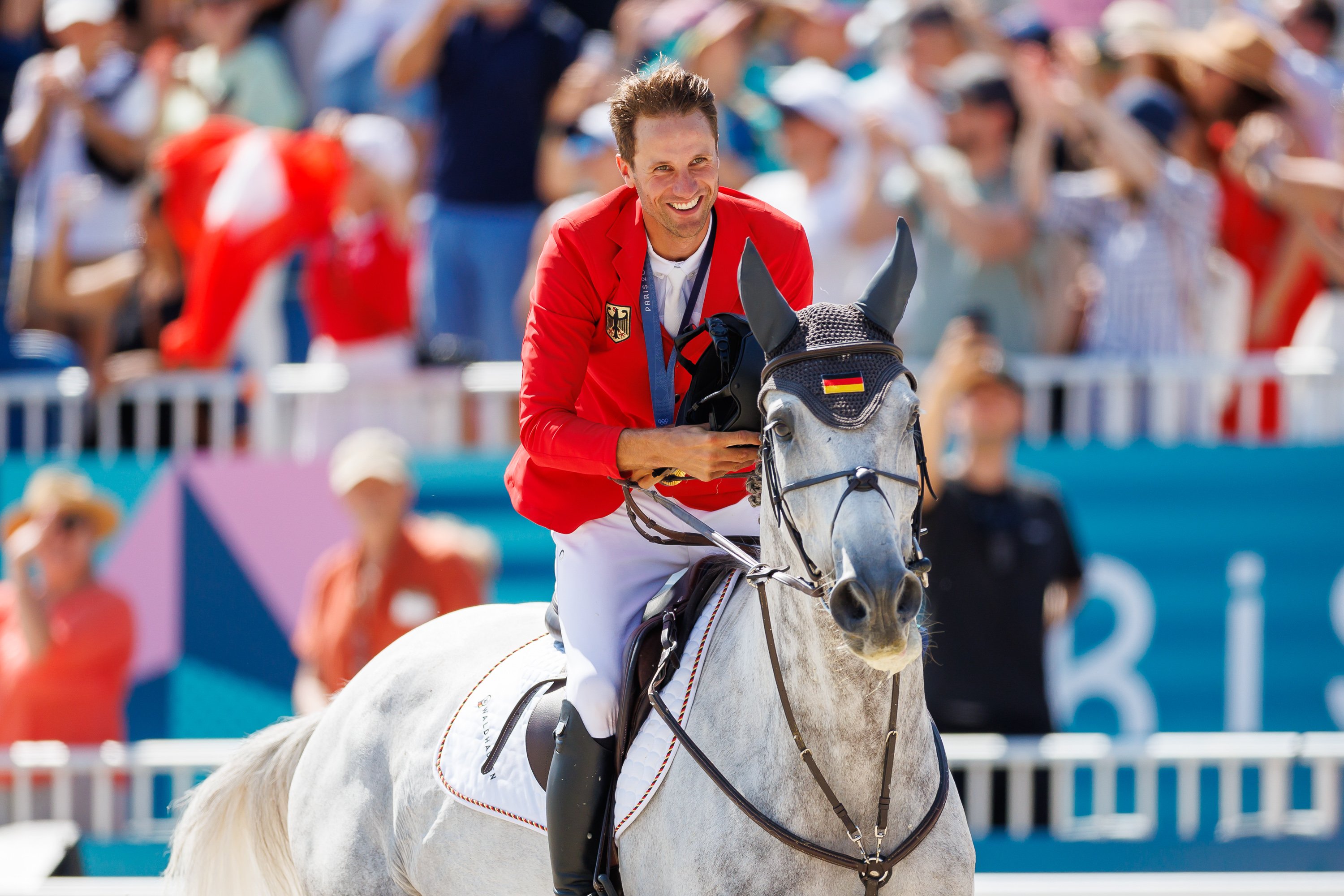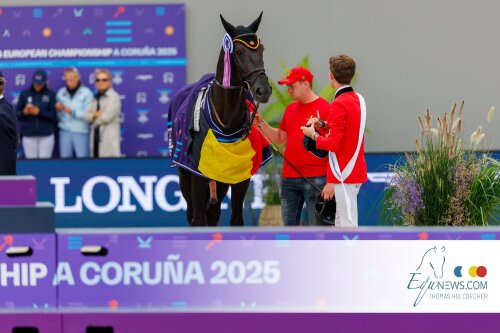In this exclusive interview, one of the biggest names in show jumping candidly shares his journey to success, the special bond with his horse Checker 47 and the challenges of the top sport. With highlights such as his impressive performances in Geneva and Aachen, and the support of his unique team, he gives us a behind-the-scenes look at a sports career at the highest level. Discover how focus, confidence and passion come together on the road to top sport and what lessons he learned that can inspire every young rider.
What an amazing year yourself and your team have had! Can you tell us about how important they have been in your successes?
Having a great team supporting you is crucial to be a successful rider. In show jumping there is so much work – managing the horses, travelling, and training – so having reliable people around you is essential. Without a strong, supportive team, it would be incredibly difficult to perform and get the best results.
You clearly have an incredible relationship with Checker 47 – can you tell what makes him so special, and how important it has been to form a partnership with him?
He is a very special horse to me. I have had him for four years, and together we have built a partnership that felt like it was made for the Paris 2024 Olympic Games final. The course wasn't built for just for an experienced rider or an experienced horse – it required an experienced combination. You had to know your horse inside and out, and they had to know you just as well. That is what made the course ideal for partnerships like Checker 47 and myself, Beauville Z and Maikel [van der Vleuten], and Dynamix de Belheme and Steve [Guerdat] – we are all experienced pairs.
Over the past four years, Checker 47 and I have grown together and achieved some great results. Last year, we won the FEI Jumping Nations Cup™ Final in Barcelona, followed by a Grand Prix win in Riyadh, and third place in the Rolex Grand Prix at the CHI Geneva. This year, we won the Rolex Grand Prix at the 2024 Winter Equestrian Festival in Wellington and the Grand Prix in Madrid. Earlier in the year, I started to feel like everything we had built over the last three years was really coming together. In every Grand Prix we entered, it felt like he knew exactly what he could do, and he knew and trusted what I could do. That trust is the foundation of a great relationship between horse and rider – when you have trust, you have everything you need.
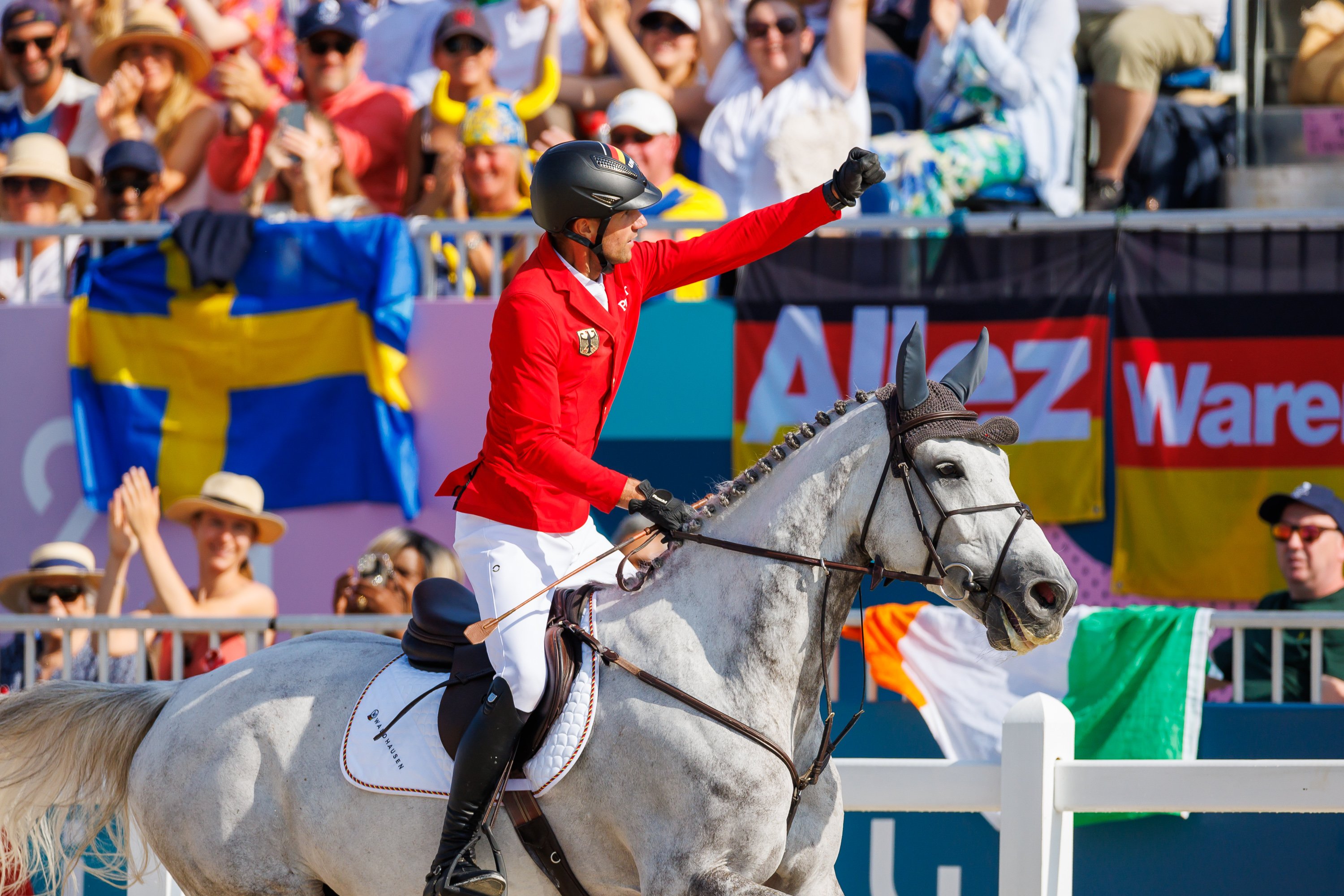
© Tomas Holcbecher
What is the most important part of training a horse to the level where they are competing in the Rolex Grand Slam of Show Jumping Majors.
That's a great question – there are many aspects to consider. At different stages, you might focus on different things for example, sometimes it is more important to focus on your horse's physical abilities, or you may work on the mental side, or simply getting to know the horse better. However, in the end, the most important thing is making sure the horse is following you. You can train the physical elements as much as you like – jumping big fences or practicing courses – but in the end what really matters is that the horse trusts you and follows your system and style of riding. If the horse isn’t on your side, success in show jumping is impossible.
While physical training is key, it is just as important to understand how your horse thinks and what it needs. You need to know when to provide extra support or when to ease off the pressure, and giving them time doing something simple like hacking or lunging. This balance of understanding both the mental and physical aspects of your horse is what makes a great rider.
Despite having an equestrian family, you started riding quite late, what prompted you to start?
I have been around horses my whole life because of my family. When I was younger, I went to the stables with them since they didn’t want to leave me alone at home. I would always bring a football along and either play with someone or kick it around by myself. There was a time when my dad didn’t have a groom to go with him to shows on the weekends, so he asked if I could help. If I didn’t have a soccer game, I would go with him to help and watch as he warmed up and competed. Over time, the more I watched, the more I became interested in the sport. I began analyzing his rounds, thinking about what he did well and what he could have done differently. Eventually, I reached a point where I wanted to give it a try myself. That is how it all started, though I quickly realised it wasn’t as easy as it looked!
The CHI Geneva is held in the largest indoor equestrian arena in the world, with some of the most passionate fans. How does it feel to compete there?
The CHI Geneva is one of the best indoor and special show in the world. Each of the Rolex Majors that make up the Rolex Grand Slam of Show Jumping is unique, and Geneva has its own distinct flare. The large arena, featuring the hill in the middle and the double of ditches in the Rolex Grand Prix, gives it the feel of an outdoor show, which is unique. However, the best thing about the CHI Geneva is the atmosphere – the crowd there is incredible. You can always feel their support, and when you jump a clear round and the crowd goes wild, it is the most amazing feeling. It is the kind of emotional moment that us riders love. Additionally, the Rolex IJRC Top 10 Final adds an extra layer of excitement, making the CHI Geneva one of the most thrilling show jumping events of the year.
You claimed third place in the Rolex Grand Prix at the CHI Geneva last year – can you explain what that result meant to you?
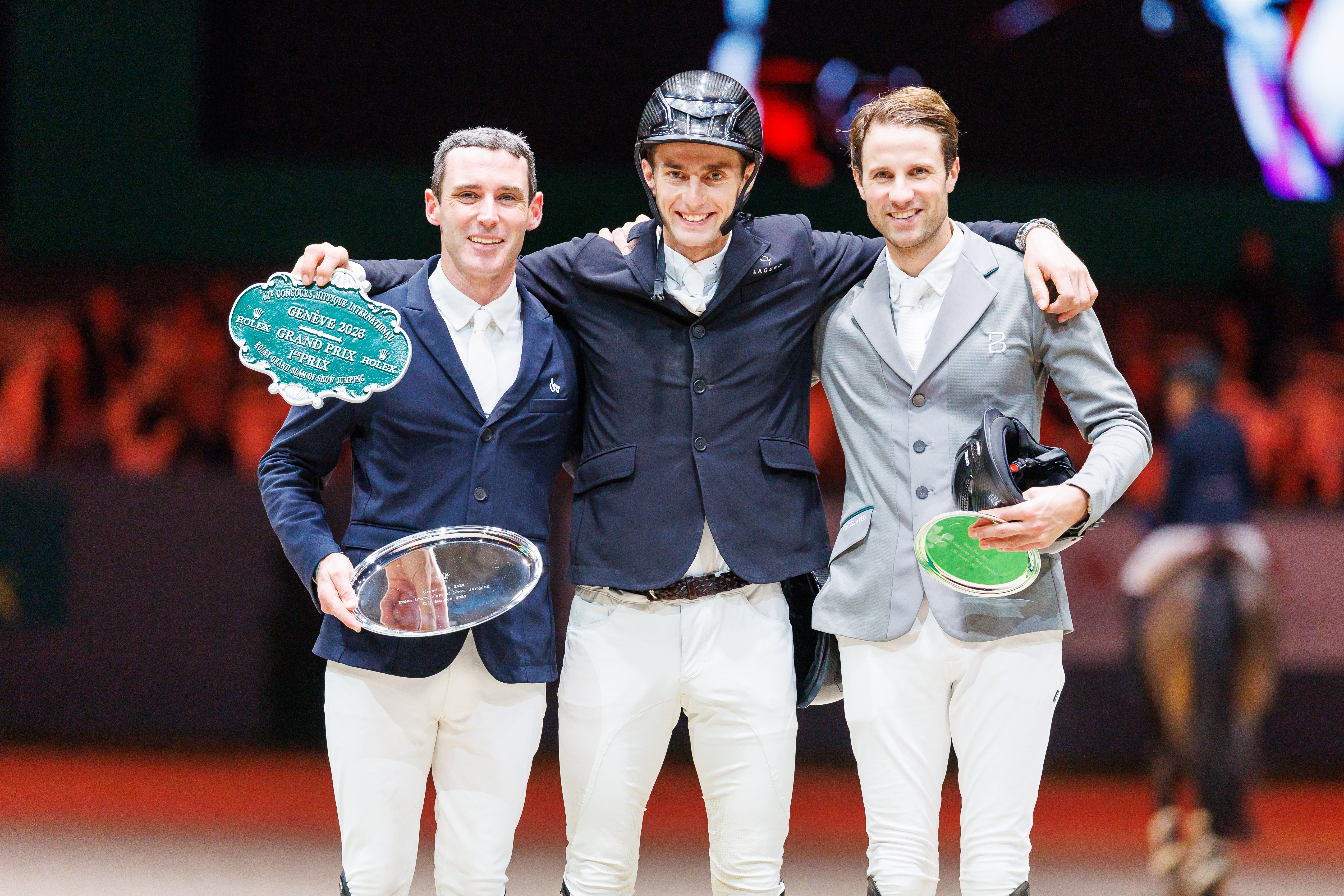
© Tomas Holcbecher
It meant a lot to me at the time. Two years earlier, I had competed there with Checker 47 in the Rolex Grand Prix, and it didn’t go very well. I felt our partnership wasn’t ready for that level yet. Last year however, I arrived with a much better feeling. The show started off well, and I went into the Rolex Grand Prix with confidence. Finishing third made me both proud and happy – it was the moment I knew Checker 47 was ready for major championships. With the Olympics coming up, that Rolex Grand Prix result solidified in my mind that he was truly prepared, and it was then that I decided we should plan his year around the Paris 2024 Olympic Games.
What lessons did you learn from last year’s Rolex Grand Prix at the CHI Geneva, that you will bring with you to this year’s competition?
I have learnt that the Majors that make up the Rolex Grand Slam of Show Jumping set the highest standard in our sport. Both yourself and your horse must be prepared for any situation that comes from the courses. I have always aspired to be part of the Rolex IJRC Top 10 Final, and after finishing third in the Rolex Grand Prix at the CHI Geneva last year, I knew a special year was ahead. I have worked incredibly hard, whilst also ensuring I had a strong team of horses around me, to make sure I could be part of the Rolex IJRC Top 10 Final — that, along with the Olympic Games, have been huge goals for me. Right now, things are looking promising for me, with one month to go and me currently ranked World No.5, and so I am hopeful I will be one of the riders competing in the Top 10 Final at the CHI Geneva, which would be incredibly exciting.
The Rolex Grand Slam of Show Jumping also includes the CHIO Aachen, with the Rolex Grand Prix being a class many show jumpers list as being the one class they really want to win. As your home Major, how important is this show and class to you?
The CHIO Aachen and the Rolex Grand Prix there is very important, as it is for any rider, but especially for German riders. Aside from winning Olympic and Championships medals, there is one dream riders have in their careers – to win the Rolex Grand Prix of Aachen. This is certainly still in the forefront of my mind.
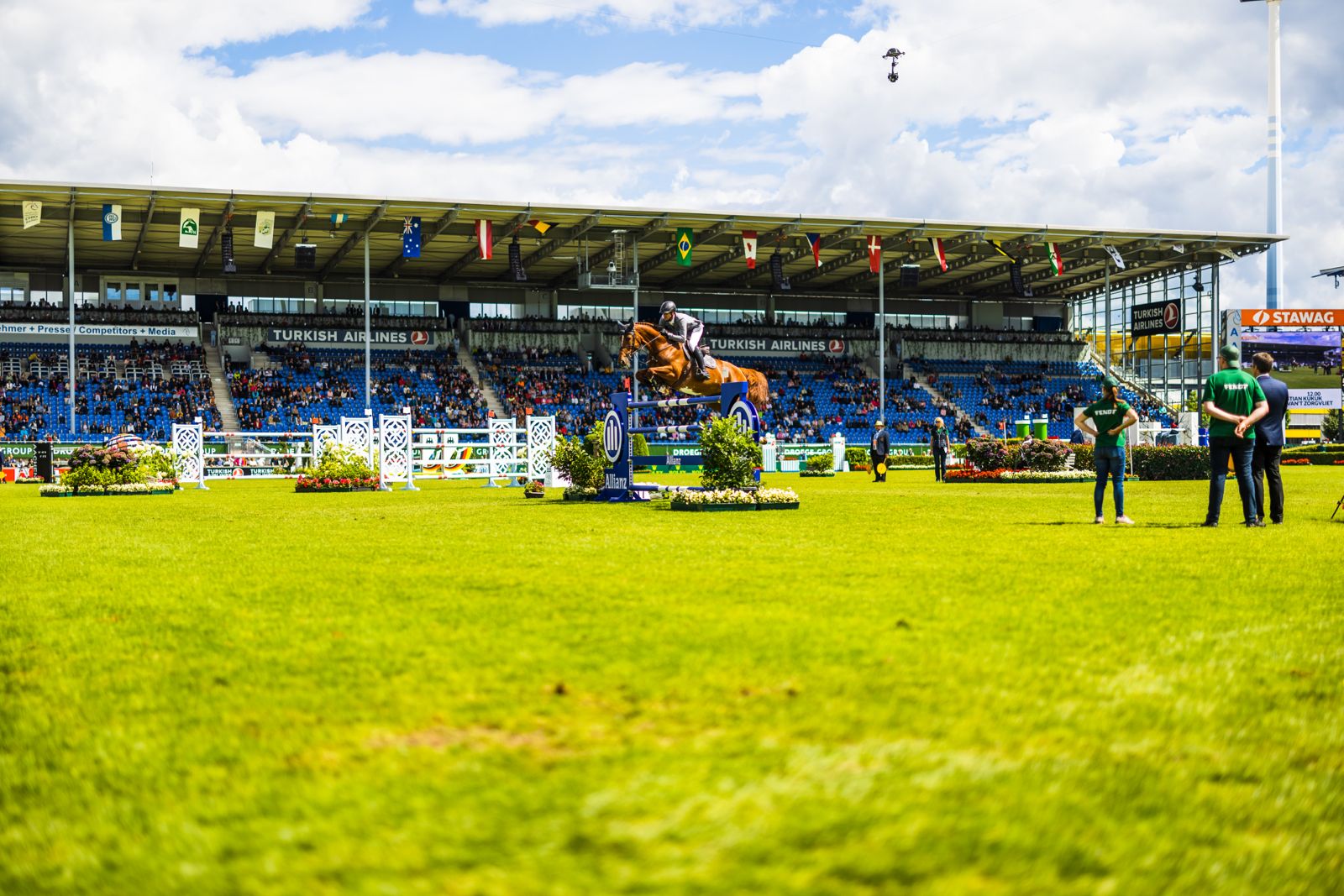
© Tomas Holcbecher
How do you adapt your strategy or plans when competing across the four Majors that make up the Rolex Grand Slam of Show Jumping?
I think this is what makes the Rolex Grand Slam of Show Jumping so interesting. To win at the Majors that make up the Rolex Grand Slam of Show Jumping – The Dutch Masters, the CHIO Aachen, the CSIO Spruce Meadows ‘Masters’ Tournament, and the CHI Geneva – it is not enough to just excel in a huge grass arena with massive fences. You also have to perform well in smaller arenas, like at 's-Hertogenbosch [The Dutch Masters]. Only the very best horses can adapt to any ring and any situation. For instance, Checker 47 placed third in the Rolex Grands Prix at both The Dutch Masters and Geneva, and he also jumped exceptionally well in Aachen. There aren’t many horses that can handle it all. Some riders are fortunate to have multiple horses – some are suited to large grass arenas, while others perform better in smaller sand arenas – but few can do well in every setting.
So far, only one pair has won the Rolex Grand Slam of Show Jumping: Scott Brash and Hello Sanctos. The fact that only one combination has achieved this in all of these years shows how incredibly challenging it is. However, this is what makes it so exciting for us riders – we all dream of winning the Rolex Grand Slam of Show Jumping once in our careers.
Away from show jumping, what other sports do you follow?
I follow soccer because I am a huge fan of Bayern Munich and have always been. Right now being a fan for them is particularly exciting for me because one of their most famous players, Thomas Müller, is a part-owner of Checker 47. We have a very special relationship. Thomas follows me in my equestrian career and I am following him in soccer, it is definitely the sport that I follow the most aside from show jumping.
Do you think that you learn anything from Thomas, or does he learn anything from you, that you would say you carry forwards in your respective sports?
I don’t think he learns from me or that I am learn from him, but what makes our relationship strong is that he is an athlete who understands the challenges of top-level sport. He knows that, in show jumping, success doesn’t come every weekend, just as I know it’s the same in soccer – it is not possible to win every game. This shared understanding helps us handle the disappointing moments. Our relationship is full of emotion, but it is also very rational. We feel joy when we succeed, but we accept that we can’t be successful all the time – that is just the nature of both our sports.
I think that is key in both soccer and show jumping is that you can’t dwell on either disappointment or success. You always need to prepare for the next game or the next show. Growing up playing soccer made me familiar with competition, pressure, and the need to focus while staying present. In show jumping, you need to be focused for a shorter period of time – spending just 60 to 80 seconds in the ring, plus 30 to 45 minutes in warm-up – but it is crucial to be fully present with your horse. I believe that having learned this from soccer has really helped me, because at the highest level, being able to focus makes all the difference.
What advice would you give to young riders who are aspiring to compete at the highest levels of the sport?
You have to take your time – creating a relationship between yourself and your horse doesn’t come overnight. If you have a disappointing moment, and there will be these moments, try to not get stuck in it. Try to see the positive and learn from the disappointing experiences and just remember to take your time.

